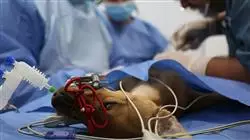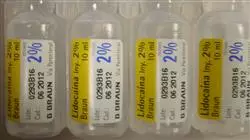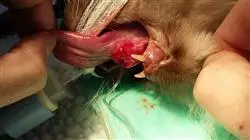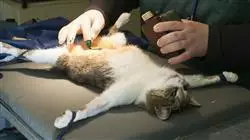University certificate
The world's largest faculty of veterinary medicine”
Description
Specialize in Veterinary Pharmacology , updating and expanding your knowledge through this revolutionary education for its quality of teaching and content, and its intensive and flexible approach at the same time"

Veterinary Pharmacology is a multidisciplinary science, fundamentally related to other disciplines: Physiology, Microbiology, Surgery, Surgical Pathology, Medical Pathology, Nutrition and Feeding, Zootechnics, Food Technology, Immunology, Infectious Diseases, Parasitic Diseases, Obstetrics and Reproduction, Companion Animal Hospital Clinic and Large Animal Hospital Clinic, among others.
Veterinary Pharmacology is a branch of veterinary science that aims to improve current outcomes in the prevention and treatment of disease at the veterinary level through pharmacological strategies. It is the science in charge of the search for and adaptation of drugs capable of solving animal health problems.
To achieve its objective, Veterinary Pharmacology must promote research into new drugs, new indications for drugs already on the market and new therapeutic strategies. On the other hand, the correct use of the drugs available at any given time for established indications should be considered. It is important to interpret the kinetics of drugs from the time they enter the body until they are eliminated. As well as the analysis of the correlation between the effects of the drugs and the concentration of their free fraction in blood, as well as the consideration of drug interactions and their undesirable effects or side effects that may occur.
This professional master’s degree in Veterinary Pharmacology contains the most complete and up-to-date program, designed by experts in Pharmacology and Veterinary Clinicians, constituting a great tool for veterinarians who wish to specialize in Veterinary Pharmacology, an indispensable tool for the professional in the veterinary clinic.
A comprehensive training in the use of veterinary drugs for the prevention and treatment of diseases affecting animal health"
This professional master’s degree in Veterinary Pharmacology contains the most complete and up-to-date educational program on the market. The most important features include:
- Innovative and up-to-date diagnostic techniques in infectious diseases and their application in daily clinical practice, including the use of cytology as a diagnostic tool in these diseases
- Infectious Pathologies oriented to the Feline Species, dealing extensively with all those of this species
- "One Health" vision, in which Zoonoses and their implications for public health will be reviewed
- Most frequent Infectious Pathologies of dogs and cats in the tropics. At present, there are no more exotic diseases, and they should be included by the clinician in the differential diagnosis when the epidemiology allows to suspect them
- Prevention and management of all infectious diseases, including clinical, home and community settings
A revolutionary study for its ability to reconcile the highest quality of learning with the most complete online specialization"
Its teaching staff includes professionals belonging to the field of Veterinary Medicine, who bring to this professional master’s degree the experience of their work, as well as renowned specialists from reference societies and prestigious universities.
The multimedia content, developed with the latest educational technology, will provide the professional with situated and contextual learning, i.e., a simulated environment that will provide immersive education programmed to learn in real situations.
This program is designed around Problem-Based Learning, whereby the specialist must try to solve the different professional practice situations that arise throughout the program. For this purpose, the professional will be assisted by an innovative interactive video system created by renowned and experienced psychology experts.
A great opportunity for the veterinary medicine professional to advance his or her competencies and catch up on all the latest developments in pharmacological approaches"

Learn in an efficient way with a real qualification objective, with this unique professional master’s degree for its quality and price, in the online teaching market"
Objectives
The professional master’s degree aims to provide students with the required competencies in relation to preclinical or clinical research of drugs used in veterinary medicine, and their application in the therapeutic use of drugs so that they can be integrated into the professional field.

Acquire the knowledge of the scientific, ethical and social foundations of Veterinary Pharmacology and the skills and attitudes for its practical application in an education created for excellence"
General Objectives
- Examine the general concepts of pharmacology at the veterinary level
- Determine the mechanisms of action of drugs
- Analyze Pharmacokinetics and Pharmacodynamics
- Review the current legislation on veterinary pharmaceutical products
- Analyze aspects related to the prescription, dispensing and administration of veterinary pharmaceutical products
- Determine the importance of the responsible and rational use of medicines for global health
- Differentiate the autonomic nervous system and its organization
- Identify the groups of drugs that act on the autonomic nervous system
- Recognize the mechanisms of action and therapeutic uses of this group of drugs
- Examine the main pharmacological properties of the groups of drugs acting on the central nervous system
- Identify the different pharmacological targets involved in CNS transmission
- Recognize the mechanisms of action, therapeutic and toxic uses of this group of drugs
- Examine the pharmacological basis of cardiorespiratory system therapy and homeostasis
- Identify the main therapeutic groups and their indications
- Determine the mechanisms of action of different drug groups, properties and pharmacokinetics
- Develop the student's critical and analytical skills through the resolution of clinical cases
- Determine the pharmacological basis of digestive tract therapy
- Identify the main therapeutic groups and their indications in veterinary medicine
- Examine different drug groups' mechanisms of action, properties and pharmacokinetics
- Develop the student's critical and analytical skills through the resolution of clinical cases
- Examine pharmacology in relation to reproduction and metabolism
- Identify each pharmacological group with its uses and applications
- Prescribe drugs in a reasonable manner
- Examine and explain the main pharmacological properties of the anti-infective drug groups
- Identify the different pharmacological targets involved in anti-infective agents
- Recognize the main pharmacological characteristics (mechanism of action, pharmacokinetics, and therapeutic and toxic effects) of groups of anti-infective drugs
- Examine and explain the main pharmacological properties of the antineoplastic drug groups
- Identify the different pharmacological targets involved in antineoplastic agents
- Know the main toxic effects of antineoplastic drugs
- Prepare professionals in simple and natural treatments, and their integration in the curative activities within Conventional Veterinary Medicine
- Examine the theoretical bases of Natural Medicines; especially homeopathy, phytotherapy and the use of nutraceuticals
- Briefly frame the evolution of the disciplines within a historical context
Specific Objectives
Module 1. General Pharmacology
- Develop all those processes that affect a drug molecule when administered to an animal species
- Establish the different biological barriers and their significance in therapeutic effectiveness.
- Examine the factors that will influence drug absorption, distribution and elimination processes
- Analyze how to manipulate the renal excretion process and its importance in the treatment of intoxications
- Establish, based on the pharmacodynamics and pharmacokinetics of a drug, its possible pharmacological interactions
- Identify and characterize at the molecular level the different types of pharmacological receptors
- Determine which second messengers and biochemical pathways are coupled to each of the pharmacological receptor types
- Present the relationship between the molecular phenomenon and the pharmacological effect
- Analyze all the phenomena involved in drug-receptor interaction
- Examine the different types of pharmacological agonism and antagonism
- Correctly establish the differences between the different species that are important for the administration of drugs or their therapeutic efficacy
- Develop the concepts of side, adverse and toxic effects
Module 2. Legal Framework for Veterinary Medicinal Products and Veterinary Pharmacovigilance
- Consult and apply current regulations in a practical way in veterinary medicine
- Quickly find the resources available on the AEMPS website and, in particular, the information available on the online Veterinary Medicines Information Center (CIMA Vet)
- Determine everything related to the veterinary prescription being able to make the appropriate prescription in each specific case
- Understand the roles and responsibilities of the various actors involved in the dispensing and supply of veterinary medicinal products
- Be able to make decisions regarding pharmacological treatments with an adequate benefit-risk ratio, or discontinue their use when this is not possible
- Examine the Guidelines for responsible use in different animal species and how to apply them appropriately in veterinary practice
- Examine the responsibility that one has in the exercise of professional work, in the use of medicines, in relation to animal health, human health and the environment
- Assume the importance of our decisions in the use of antimicrobials, in the prevention and control of antimicrobial resistance and know and follow the PRAN guidelines
Module 3. Pharmacology of the autonomic nervous system
- Establish the classification of drugs according to their structure, mechanism of action and pharmacological action acting on the Autonomic Nervous System
- Distinguish the chemical mediators and receptors that interact in the autonomic nervous system
- Determine the classification of drugs by their mechanism of action and pharmacological action that act on the autonomic nervous system
- Analyze the drugs that act at the level of cholinergic transmission in the Autonomic Nervous System by their structure, mechanism of action and route of administration
- Examine drugs acting at the level of adrenergic transmission in the autonomic nervous system by their structure, mechanism of action and route of administration
- Determine the general effects of neuromuscular blocking agents on the peripheral nervous system by their mechanism of action and pharmacological action
- Solve problems and interpret results of pharmacological experiments associated with the organ bath technique
- Acquire the ability to search for and manage information related to the Autonomic Nervous System
Module 4. Pharmacology of the central nervous system
- Establish the classification of drugs according to their structure, mechanism of action and pharmacological action acting on the Central Nervous System
- Always act with the objective of facilitating good health and quality of life for the animals, avoiding unnecessary suffering through the administration of different drugs
- Distinguish the chemical mediators and receptors that interact in pain
- Differentiate the classification of analgesic drugs by their mechanism of action and pharmacological action acting on the Central Nervous System
- Analyze the drugs that act at the level of anesthesia and sedation in the Central Nervous System by their structure, mechanism of action and route of administration
- Determine the general effects of stimulant drugs on the Central Nervous System and recognize their mechanism of action and pharmacological action
- Determine the general effects of depressant drugs on the Central Nervous System and recognize their mechanism of action and pharmacological action
Module 5. Pharmacology of the Cardiovascular, Renal and Respiratory System. Hemostasis
- Describe the mechanisms of action of drugs used to treat heart failure, hypertension or arrhythmias
- Examine anti-anemic drugs and growth factors, as well as mechanisms of action, adverse reactions and pharmacokinetics
- Determine the main routes of administration of drugs used in the cardiorespiratory system and homeostasis
- Present the drugs used against cough, mucolytics and expectorants and their mechanisms of action, adverse reactions, pharmacokinetics and side effects
- Solve problems and clinical cases related to the cardiorespiratory system
- Associate the correct drug to the main symptoms and pathologies of the cardiorespiratory system
- Safe and effective use of pharmaceuticals
Module 6. Pharmacology of the Digestive System
- Identify the most common routes of administration of each of the drugs and the forms of presentation of the same in veterinary medicine
- Examine drugs related to acid secretion: antisecretory, antacids and mucosal protectants, as well as their adverse effects, contraindications and pharmacokinetics
- Present drugs to improve gastrointestinal motility, their mechanisms of action, drug interactions and adverse reactions
- Describe the drugs used to treat vomiting
- Determine the pharmacology of the hepatobiliary and pancreatic systems, their mechanisms of action, interactions and pharmacokinetics
- Solve problems and clinical cases related to the digestive system
- Associate the correct drug to the main symptoms and pathologies of the digestive tract
Module 7. Pharmacology of the Endocrine and Reproductive System. Reproductive Disorders
- Determine the pharmacological basis of reproductive system therapy
- Examine different drug groups' mechanisms of action, properties and pharmacokinetics
- Identify the main therapeutic groups and their indications in veterinary reproduction
- Treat the most prevalent obstetric cases
- Present reproductive biotechnologies and understand the scope of their application
- Solving individual and population reproductive problems
- Establish the different animal pathologies of the endocrine system and their treatment
- Identify the main therapeutic groups and their indications in endocrine system pathologies
- Develop the student's critical and analytical skills through the resolution of clinical cases
Module 8. Antiseptics and Chemotherapeutics I
- Analyze the historical development of antiseptic and chemotherapeutic substances
- Point out the general principles of chemotherapy and the drugs that comprise it
- Define the concepts of antiseptic and antibiotic
- Explain the mechanisms of antibiotic resistance
- Classify antibiotics according to mechanism of action
- Describe each of the groups of antibiotics and know their mechanism of action
- Classifying antifungal and antiviral drugs
- Describe each of the groups of antifungal and antiviral drugs and their mechanism of action
- Analyze the importance of antiparasitics in Veterinary Medicine
Module 9. Chemotherapy II: Antineoplastic Drugs
- Analyzing cancer in small animals
- Point out the general principles in the use of antineoplastic drugs
- Know the care in the application of antineoplastic drugs
- Classify the main families of chemotherapeutics
- Determine the main drugs for palliative use in neoplasms
- Consider the use of each antineoplastic according to the pathology
- Analyze the main toxicity effects of antineoplastic drugs
- Describe each of the groups of antifungal and antiviral drugs and their mechanism of action
- Analyze the importance of antiparasitics in Veterinary Medicine
Module 10. Natural Therapies: Homeopathy, Phytotherapy and Nutraceuticals
- Analyze objective clinical signs or manifestations and subjective symptoms or perceptions in homeopathy
- Approach the anamnesis from these objective and subjective manifestations
- Present the Homeopathic Materia Medica and its therapeutic indications
- Determine the rationale behind the development of drugs
- Approaching the approach to pathologies from homeopathic repertorization
- Establish the active principles most commonly used in phytotherapy and their application
- Examine the different nutraceutical products and their application

A path to achieve training and professional growth that will propel you towards a greater level of competitiveness in the employment market"
Professional Master's Degree in Veterinary Pharmacology
.
The pharmacological field in the veterinary field plays a fundamental role for the proper care of animals, for such reason, having professionals specialized in the field is essential to provide a therapeutic service with the highest quality standards. At TECH Global University we understand perfectly the relevance of working with properly prepared individuals, so we have structured the Professional Master's Degree in Veterinary Pharmacology as an excellent opportunity for professional qualification. In our program of 1,500 instructive hours, those interested will have access to new thematic axes, in which they will develop an optimal conceptual background in relation to the legal regulation in the pharmacological sector, deepening in the creation of products focused on the different problems of the veterinary field.
The best postgraduate program in animal pharmacology 100% online
.
This TECH program has a highly prepared and experienced faculty. Through their guidance you will achieve to qualify you correctly in conceptual areas related to antiseptics, chemotherapeutics, natural therapies and reproductive disorders, among other contents of great academic value. In addition, throughout our program you will learn innovative diagnostic techniques in the detection of infectious diseases, as well as their application in clinical practice. Likewise, we will provide you with different tools that will facilitate the resolution of complex problems, in order to guarantee a competent service focused on the patient's needs.







